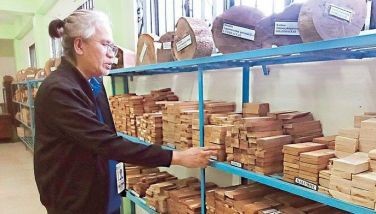DENR roadside checkpoints abolished over extortion allegations
MANILA, Philippines - Some 161 of 274 roadside checkpoints of the Department of Environment and Natural Resources (DENR) have been abolished in the wake of reports that some department personnel were abusive and mulcting money from timber firms.
Environment Secretary Ramon Paje issued the directive to all his regional executive directors so that they would be able to assess which checkpoints will be most effective in catching undocumented timber.
The remaining 113 checkpoints represent a 59-percent drop of the total figure, or one percent short of the 60 percent that Paje had set when he ordered the regional offices to limit the number of DENR checkpoints “according to the most strategic locations” and dismantle non-essential ones that were reportedly squeezing legitimate timber traders to shell out grease money even when they present proper documents for their cargo.
“The dismantling of non-critical checkpoints will give more muscle to internal and external control mechanisms for monitoring the effectiveness and integrity of these checkpoints, as this demonstrates the administration’s resolve to take strict and prompt disciplinary measures to stop systemic corruption in the service,” Paje stressed.
Paje’s order was in response to complaints of timber firms that DENR personnel manning these checkpoints had been mulcting money from them despite permits presented during transport of legitimate timber products to sawmills and other wood processing plants in the country from tree plantations where most of the lumber sold in lumberyards are grown and harvested.
Many of the retained checkpoints are those in roads leading in and out of protected areas where cutting is banned, while others are mobile or unannounced checkpoints that are set up on short notice based on spot reports or intelligence information provided by local police and military authorities and concerned civic groups.
The easing of checkpoints in non-critical areas is also a gesture of confidence-building Paje is extending to wood-based firms comprising the Philippine Wood Producers Association (PWPA) that has been leading the call for the DENR to reexamine its forestry-related policies and regulations, especially on checkpoints.
At the same time, he called upon the timber firms to install closed-circuit television (CCTV) cameras in their wood processing facilities to prove they are not buying undocumented timber in exchange for his move to remove the non-critical checkpoints.
“With the CCTV cameras, we can also easily identify if they are processing illegally-cut timber because natural forest logs are much bigger than those from plantations,” Paje said.
Plantation logs are round-shaped, measuring about 15 to 16 inches in diameter, while logs from natural forests are bigger and irregularly shaped at around 27 to 28 inches in diameter.
Last month, Paje issued Memorandum Order No. 9 banning the acceptance and processing of new applications for timber contracts to cut trees inside natural forests.
In an e-mail note, PWPA president Antonio Olizon described the 59-percent drop as“a substantial decrease in the number of checkpoints,” even as he suggested certain measures to ensure the effectiveness of the checkpoints’ entry-exit system to track the arrival and departure of their wood products.
“Checkpoints should be equipped with official or registered logbooks so every truck’s details will be recorded and signed by them and can be audited by other DENR officials without tampering the records,” Olizon noted, adding that the operation of checkpoints should be placed under a system of check and balance that will look into their activities and records, preferably by a third party.
- Latest
- Trending






























